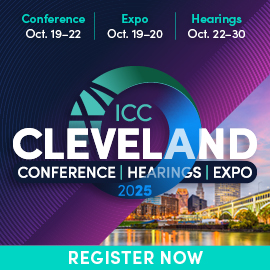
Jurisdictions Adopt I-Codes to Create Safer, More Sustainable Communities
![]() I-Codes reduce costs, facilitate new products and technologies
I-Codes reduce costs, facilitate new products and technologies
Jurisdictions across the United States continue to ensure that homes, schools, offices and other buildings within their communities remain safe and sustainable by adopting and implementing International Codes, known as the “I-Codes.” Adopting the I-Codes reduces costs by use of consistent, coordinated building regulations that allow for new products and innovative technologies. The I-Codes provide minimum safeguards for people at home, at school and in the workplace.
While every state, most federal agencies, and a growing number of nations around the world use many of the I-Codes, adoptions of the latest versions of the I-Codes have recently occurred in Maine, Ohio, Maryland, North Carolina, New Jersey, New York and Washington.
The state of Maine adopted and implemented its first statewide building code, the Maine Uniform Building and Energy Code, which contains 2009 editions of the International Building Code (IBC), International Residential Code (IRC), International Energy Conservation Code (IECC), and the International Existing Building Code (IEBC).
“The good thing about it is that is creates uniformity, as the name says Maine Uniform Building and Energy Code,” Barbara Berry, who is with the Maine Association of Realtors, said. “So that if a builder builds in Arundel or Biddeford or Kennebunk or Presque Isle, the rules are the same; there’s a uniform code for the entire state.”
Ohio recently adopted the 2009 versions of the IBC, International Plumbing Code (IPC), and the IMC, with the support of a coalition involving the Ohio Chapter of the International Association of Electrical Inspectors, the Ohio Building Officials Association, the Ohio Chapter of AIA, the Ohio Fire Officials Association and other organizations, including the Ohio Chemistry Technology Council and the Ohio Chapter of the Sierra Club.
New Jersey recently adopted the 2009 IBC, IRC, International Fuel Gas Code (IGFC,) International Mechanical Code (IMC), IECC and the 2006 International Fire Code (IFC).
The state of Maryland also put into effect several codes statewide including the 2009 IBC, IRC, IECC, IFC, IMC, IPC, International Property Maintenance Code (IPMC), and IEBC.
North Carolina adopted the 2009 IBC, IFC, IFGC, IMC and IPC. The codes will go into effect Sept. 1, 2011. These are the base codes, with North Carolina state amendments, which will help form the North Carolina Building, Fire, Fuel Gas, Mechanical and Plumbing Codes.
New York updated their statewide Energy Code, adopting the 2009 edition of the IECC at the end of the year.
Washington adopted the 2009 versions of the IBC, IRC, IFC, IFGC and IMC. Other jurisdictions in Washington adopted and updated more than just the statewide I-Codes:
- Arlington (2006 IEBC, ICC Performance Code [ICCPC], IPMC)
- Battle Ground (2006 IEBC, IPMC)
- Cheney (2006 IPMC)
- Olympia (2006 IEBC, IPMC)
- Richland (International Green Construction Code [IGCC] Public Version 1.0, 2009 IEBC, ICCPM, IPMC)
Puerto Rico recently adopted the 2011 Puerto Rico Building Code (PRBC) which includes nine of the 2009 International Code Council model codes. This 2011 adoption by the PRBC includes the 2009 IBC, IRC, IFC, IECC, IPC, International Private Sewage Disposal Code (IPSDC) IMC, IFGC and IEBC, with local amendments.
Many other jurisdictions are adopting and enforcing the I-Codes across the United States such as Kayenta, Ariz., which recently adopted the 2006 editions of the IBC, IRC, IMC and the IGCC Public Version 2.0. Kayenta is also a part of the Navajo Nation, helping to solidifying a recent Memorandum of Understanding signed by ICC and Native American Construction Training Management (NACTM) Inc., which combines safe and sustainable construction methods that result from building to code and continues the Native American heritage for efficient use of natural resources. Other local jurisdictions adopting and updating I-Codes include:
- Aspen, Colo.
- Burnet, Texas
- Belmont, Mass.
- Elkton, Ohio
- Evanston, Ill.
- Island Park, Idaho
- Porterville, Calif.
- St. Louis Co., Mo.
- Traverse City, Mich.
- Tucson, Ariz.
U.S. jurisdictions were not the only recent adopters of the I-Codes. Abu Dhabi, United Arab Emirates, recently adopted eight of the I-Codes including the IBC, IFC, IECC, IMC, IPC, IFGC, IPSDC and IPMC.
The International Code Council, a membership association dedicated to building safety, fire prevention and energy efficiency, develops the codes used to construct residential and commercial buildings, including homes and schools. Most U.S. cities, counties and states choose the International Codes, building safety codes developed by the International Code Council. The International Codes also serve as the basis for construction of federal properties around the world, and as a reference for many nations outside the United States.








